
Introduction
In a fast-paced world where cognitive agility is crucial, understanding the intricate relationship between our lifestyle and brain health is paramount. Dr. Jessica Mitchell, a reputable expert in the field, brings her insightful knowledge to shed light on how our choices impact cognitive function. Whether you’re a health enthusiast or someone seeking advanced techniques to optimize brain health, this article dives deep into the connection between lifestyle and cognitive impact.
The Brain’s Marvelous Complexity
Before we delve into the profound connection between lifestyle and brain health, let’s appreciate the marvel that is the human brain. The brain, with its billions of neurons and intricate neural networks, governs every aspect of our existence. It’s not just about intelligence; it’s about memory, emotions, decision-making, and even our personality traits.

Lifestyle Choices and Cognitive Wellness
Nourishment for the Mind: Nutrition’s Role
Dr. Jessica Mitchell emphasizes that what we feed our bodies also fuels our minds. A balanced diet rich in antioxidants, omega-3 fatty acids, and other essential nutrients supports brain health. Conversely, excessive sugar, unhealthy fats, and processed foods can contribute to cognitive decline.
Key Nutrients for Brain Health
| Nutrient | Sources | Benefits |
|---|---|---|
| Omega-3 Fatty Acids | Fatty fish, flaxseeds, walnuts | Enhance memory and cognitive function |
| Antioxidants | Berries, dark leafy greens | Protect brain cells from oxidative stress |
| B Vitamins | Whole grains, lean meats | Support nervous system and cognitive function |
Movement and Mental Agility
Physical activity isn’t just for the body; it’s a catalyst for mental prowess. Engaging in regular exercise increases blood flow to the brain, promoting the growth of new neurons and enhancing cognitive functions like memory and problem-solving.
Comparing Physical Activities
| Activity | Benefits | Duration |
|---|---|---|
| Aerobic Exercise | Increases brain-derived neurotrophic factor (BDNF), | 30 minutes, 3 times/week |
| supports cognitive functions | ||
| Yoga | Reduces stress, enhances mindfulness | 45-60 minutes, 3 times/week |
| Resistance Training | Improves memory and executive function | 45 minutes, 2 times/week |
Quality Sleep: The Brain’s Rejuvenation
Sleep is often underestimated, but it’s vital for cognitive function. Dr. Jessica Mitchell underscores the importance of getting quality sleep for brain health. During sleep, the brain detoxifies, consolidates memories, and repairs neurons.
Mindfulness and Cognitive Resilience
Practicing mindfulness, meditation, and deep breathing cultivates cognitive resilience. These techniques reduce stress, boost focus, and improve emotional regulation, all contributing to a healthier brain.
Conclusion: Nurturing Your Cognitive Destiny
As Dr. Jessica Mitchell’s insights reveal, our lifestyles profoundly influence our brain health and cognitive abilities. By making conscious choices about nutrition, physical activity, sleep, and mindfulness, we can enhance our cognitive resilience and unlock the full potential of our minds. Whether you’re well-versed in the subject or seeking advanced insights, taking proactive steps toward a brain-healthy lifestyle is an investment in your cognitive future.
Remember, the brain is a dynamic organ that responds positively to nurturing and care. Let Dr. Mitchell’s expertise guide you on this remarkable journey towards optimizing your cognitive well-being.

About Dr. Jessica Mitchell
Dr. Jessica Mitchell is a renowned expert in neuroscience and cognitive health. With a Ph.D. in Neurobiology and years of research experience, she has contributed significantly to the understanding of brain health. Her research focuses on the impact of lifestyle factors on cognitive function and ways to enhance brain health throughout life.










